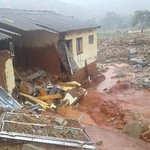Hope on the hard streets
By Bethany | Bangladesh in South Asia

Mimi's father died when she was only 10 years old and her family was left without anyone to provide for their them. Not seeing any other alternative, Mimi's mother sent her away to work as a house helper. In her new job, Mimi was responsible for the household: washing dishes, cleaning floors, doing laundry, and whatever else was requested of her. Instead of being treated kindly for her hard work, Mimi was beaten, left to starve and sexually abused. Twice she escaped the foul treatment and returned home, only to be sent away again to work for other families. When her third employer passed away, Mimi again found herself without any means to provide for her family. Rather than returning to her home to be sent away again, Mimi decided to try working in a garment factory.
When she moved in, Mimi was unaware that her fellow factory worker and new roommate was a prostitute. But when Mimi soon realized that her factory wages were not enough to feed her family, her roommate took the opportunity to introduce her to the sex trade. Without understanding the consequences of this decision, Mimi began her dual life: working in the factory by day and working in the brothel at night.
One night, Mimi met a man at the brothel who promised to marry her if she left the brothel. With this promise she was hopeful that her life would improve. Even though this man eventually made good on his promise to marry her, a better future was still out of her grasp. Her husband didn't provide for them and when she became pregnant, Mimi again found herself without the resources to survive.
Caught in another difficult situation, Mimi was unaware that the God Who Sees had already laid the foundation to provide for her. Eight years ago, a program began in the capital of Bangladesh with the goal to meet the needs of women and children in high risk situations. In addition to a homeless shelter for women and children, this program offers a holistic training program. They provide a literacy course, vocational skills such as sewing, jewelry making, and cleaning, which are directly related to their future employment. They also provide life skills training, values teaching, parenting tools and health classes. The women in this program receive a stipend so they can leave their life on the street, rent a home, and provide for their own basic needs.
When Mimi first came to the center to begin taking courses in the training program, she was pregnant and starving. Even though she desperately needed help, she was hesitant about the Christian people she interacted with at the center. All her life, she had been taught that Christians were immoral, and if she even ate something from the hand of a Christian, she would go to hell. But for the first time, Mimi began to experience God's love through the people at this program and it changed everything.
Today, this woman who wouldn't associate with Christians, attends devotions every day. She believes that Jesus is mightier and more powerful than any other prophets, and she has put her faith in him. Whenever things get difficult, Mimi cries out to Jesus, and asks the program staff to pray with her.
These days, Mimi will tell you that she understands she can depend on God for everything. Understanding what Jesus did for her, she never wants to go back to her previous life. She has learned from her loving Heavenly Father how to provide a safe and healthy future for her son. She wakes every day, determined to provide an education for her son and to protect him from the hardships she endured. Thanks to God's love, shown to her through the program, Mimi has found hope and reprieve from the hard streets of Bangladesh.
Prostitution in Bangladesh
• Estimated 100,000 female prostitutes in Bangladesh.
• One of the world's largest brothels, with 1,600 prostitutes, is located in Bangladesh.
• Poverty, broken families, abandonment, or sexual abuse are all reasons a woman might be forced into the sex trade.
• Some women are "independent" while others, especially in the case of underage girls, are controlled by pimps or madams.
• Women who were trafficked can work to buy their freedom. Once they're free, however, they often stay in the sex trade because, due to stigma, they're unemployable elsewhere.
Related stories

Uruguay immigrants are putting down New Roots Duplicate 1
Uruguay has a large immigrant population, and students from the vocational programme at the Biblical Seminary of Uruguay, a partner of SIM, realised many foreigners were finding it difficult to adjust to their new home. New Roots ministry was formed to assist these newcomers!
Zimbabwe new stories 2 only en-gb fr
Short Summary
Zimbabwe new stories fr
short summary

